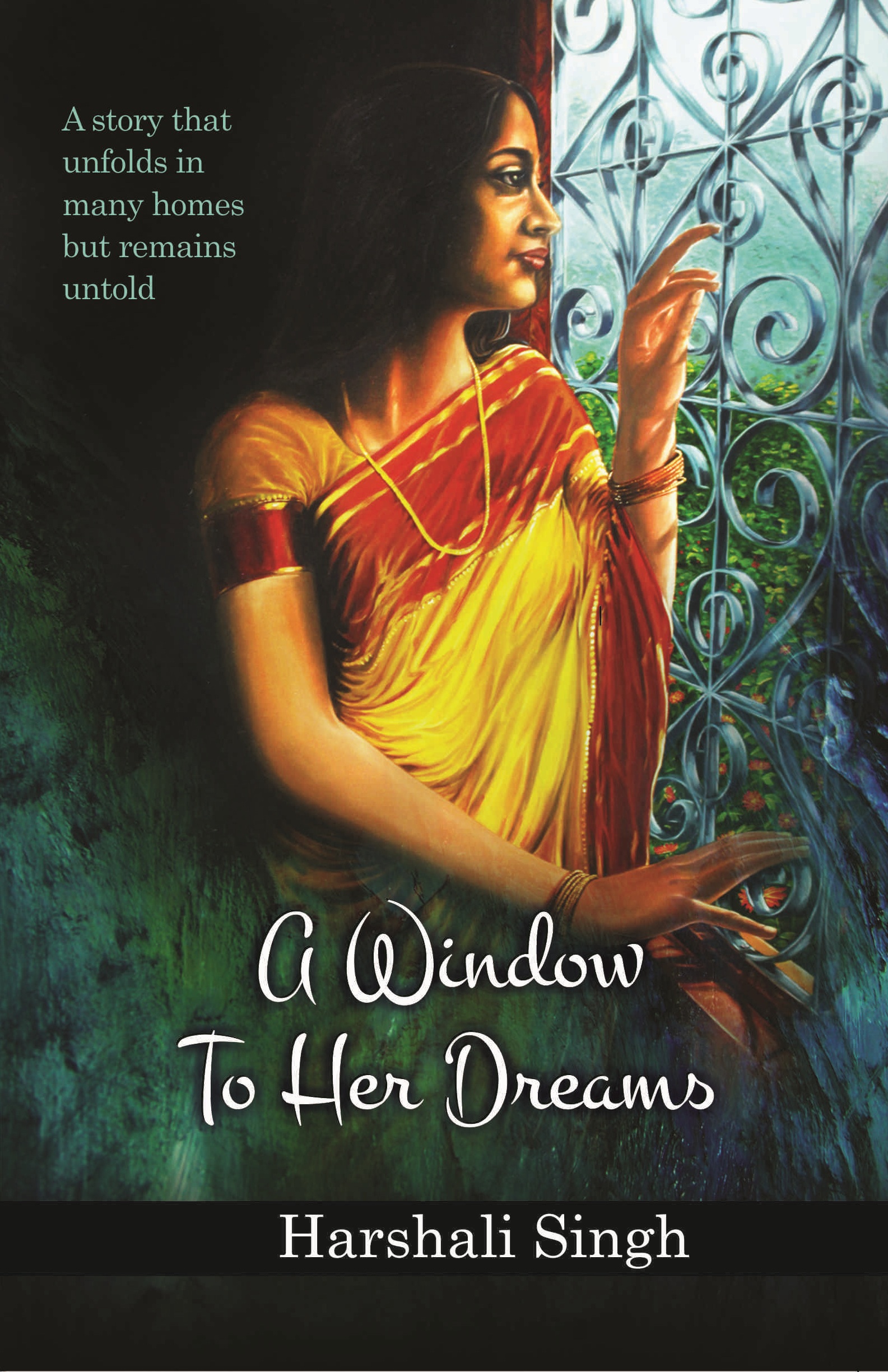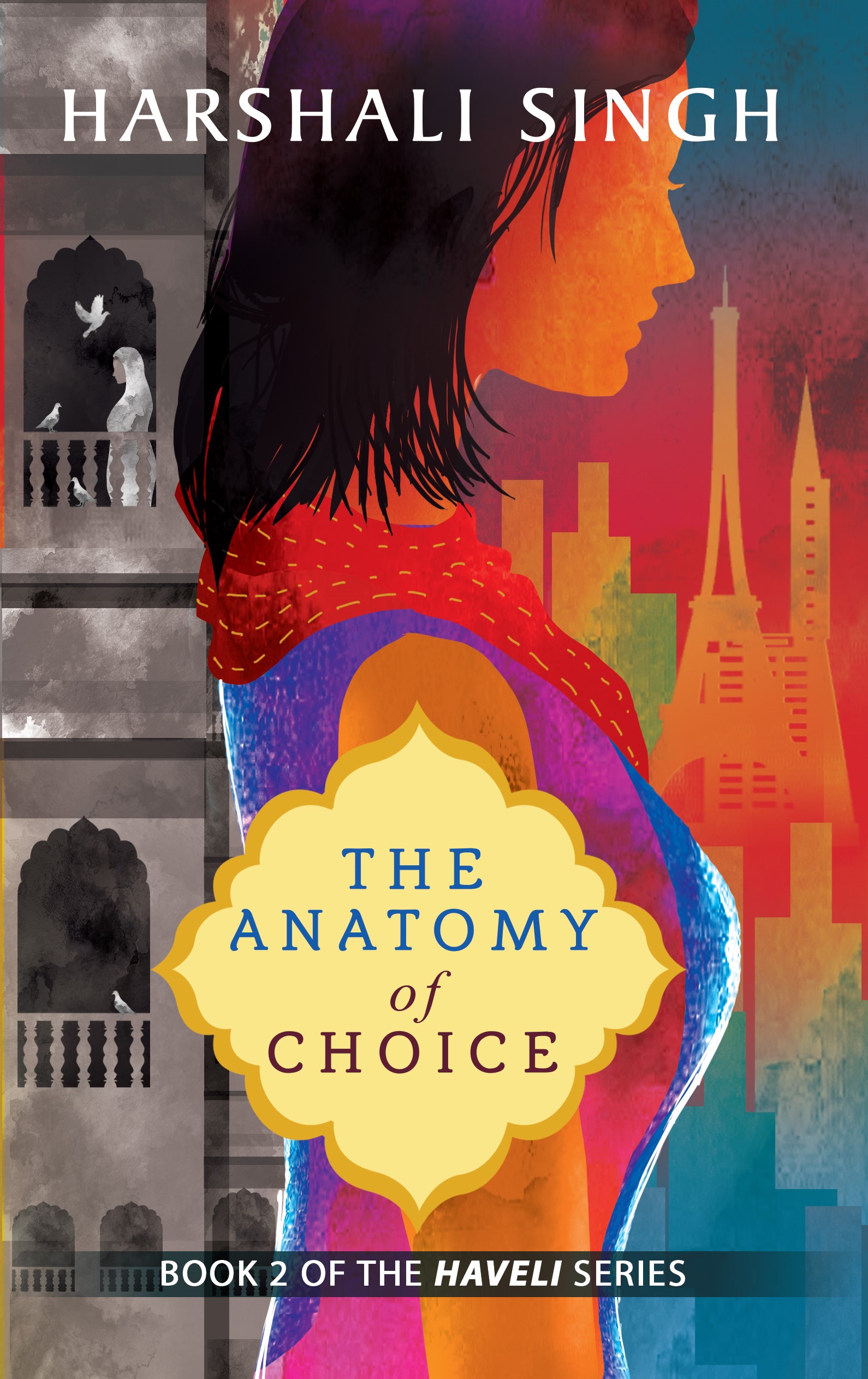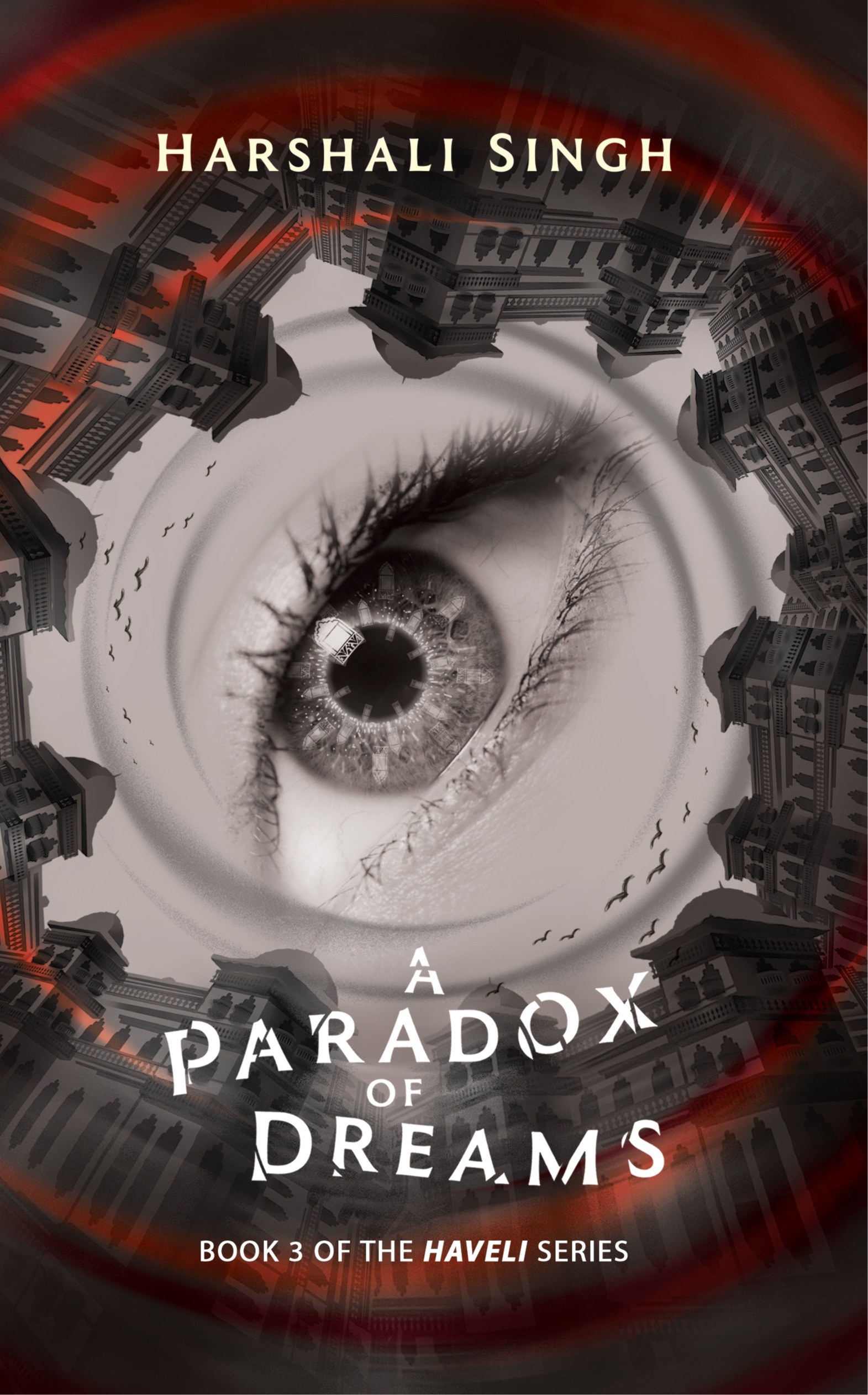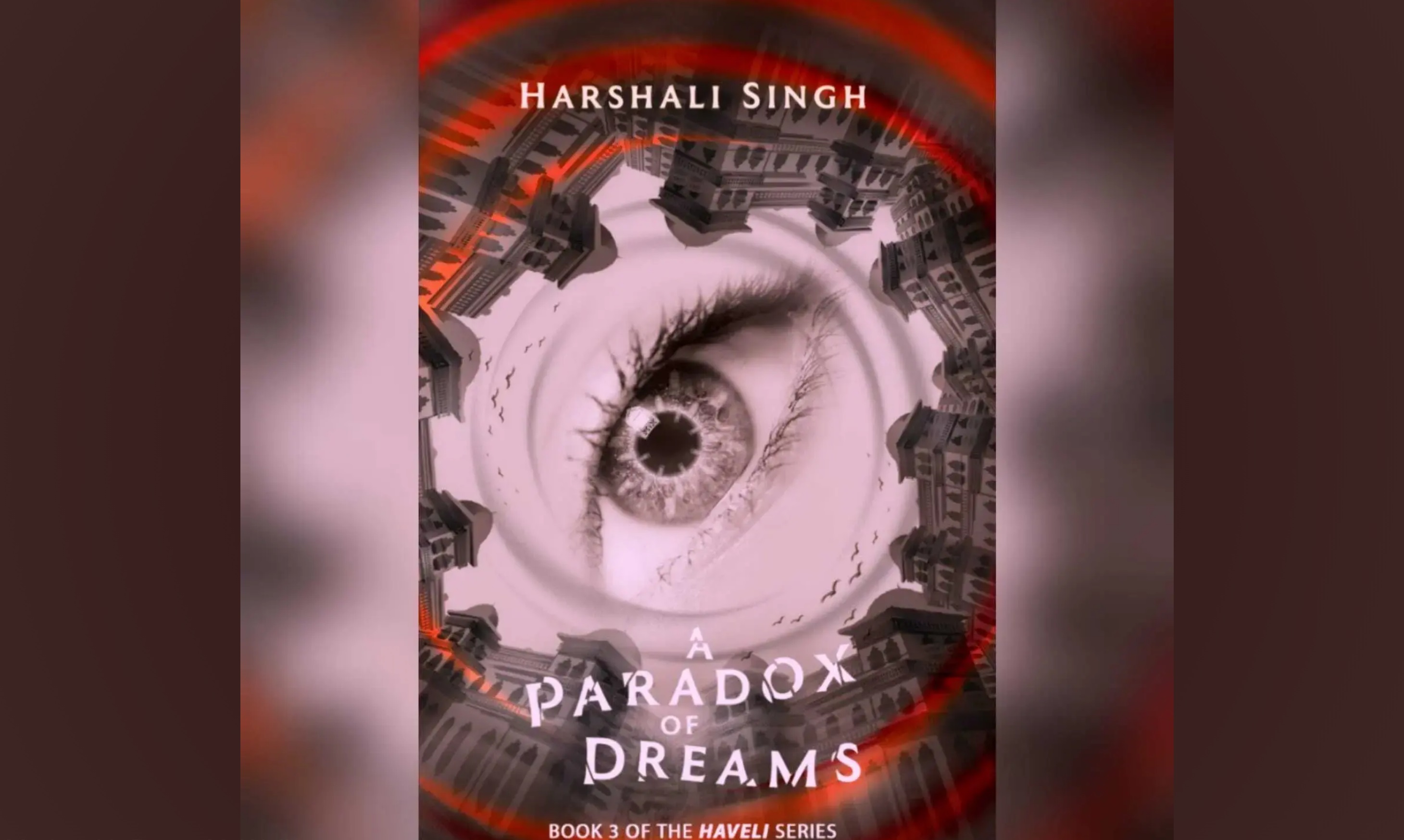The third book in the Haveli Series by Harshali Singh, A Paradox of Dreams, has just been released.
Dr. Harshali Singh is a New Delhi-based Member of the District Consumer Dispute Redressal Commission, an Author, a Poet, an academician, a teacher trainer, an Occupational Therapist, an avid reader, and a passionate Painter.
She has written in several literary genres ranging from poetry to fiction, columns to essays. She is the contributing author in several anthologies. Her short stories are featured in several e-magazines.
To know more about the author, click here and visit her profile.
On the eve of the release of her book, Readomania caught up with Harshali on the book, her writing, and more.
Readomania: You are now three books old in the Haveli Series. What keeps you going with the Haveli Series?
Harshali: I am a firm believer that things happen to us when they are destined to and not a moment sooner. I began writing the Haveli Series without the weight of expectations. It was the story that needed to be told, and I wanted to tell it.
The Haveli Series began with an idea of all that I had observed and absorbed growing up as a girl in India, and then my experiences and questions plagued me as I made my way through life as a tumultuous young adult. This series has become about all the adversities I see in our society, and hence it keeps evolving and changing what the stories want to articulate and express.
It's the women that keep me hooked. They are such multifaceted and intriguing personalities. I find that women are complex, layered, and have a large bandwidth emotionally and mentally, and hence I try to imitate these dynamic beings as my heroines. My writing is very female-centric, and I am proud of that fact. Through my stories, I would like to join my voice in their ever-growing roar that women can no longer be seen as a damsel or someone who needs her decisions made for her, as is the reality of our patriarchal society.
The Haveli Series chronicles the life of the family that resides in the Haveli of 100 doors in Old Delhi. The lives of the family members are inexplicably intertwined with the Haveli as it watches over them, absorbing their angst and reflecting their happiness as it articulates their lives through the stories. It attempts to portray relationships within a family with realism and essentially deals with urban adult subtleties of relationships, depicting the world we inhabit.
The Haveli Series has been a cathartic playground for my mind. I am able to give free rein to my thoughts, the questions I grapple with, and my opinions through these stories. It is my small effort to tell the youth that they have the right and the choice to decide for themselves and live their life on their own terms.
Readomania: That makes a lot of sense. But why did you choose to base your story in the Haveli with 100 doors?
Harshali: A chance visit to the Haveli of the 100 doors that exists even today in the by-lanes of Old Delhi in Naugraha became the inspiration to write the story about the large Sharma family. I wondered about all the people who had passed through the doors I was entering. If the walls could tell us the stories of all the people who had lived within them, what kind of stories would they tell–stories of love, grief, horror, joy or numbness.
I wondered who all had touched the tall pillars that stood silently observing the humans? Were the hands henna hued or hard? What skeletons lay behind the wooden cupboards? Whose eyes had peeped down from the jallis of the Haveli?
When I entered the foyer, I saw a sunbeam with dancing dust motes fall near my feet. It was surreal, the tall columns, the peeping roshandans, and curly grilles. It was a mystical and magical moment, and the snapshot got captured in my subconscious. I knew then I would make this Haveli my own one day.
The Haveli became the foundation on which the stories of the newest residents–Arun Sharma, his wife Uma, and their seven children, Aruna, Bhavya, Charu, Dheeraj, Etti, Fanny, and Gina, were based.
An omnipresent character in the lives of the Sharma family, the Haveli became the sutradhar, the narrator in the books who commands love respect and has a strange connection with the lady of the manor, Uma. It is the silent sentinel who stands beside the family as they go through life and its peaks and valleys.
It was also the connection to Delhi as I was born and brought up in the city, and my penchant for observing people and their silent interplay when they think no one is looking has led me to constantly absorb my surroundings.
Readomania: How did you draw your inspiration for all the characters? Are they someone you know?
Harshali: When I first started writing, I thought I would write a book on family, relationships, and love. But I think as women, we absorb and observe so many little cuts along our own journeys. And as I watch others, I tend to question these lacunae that still exist in our society. Especially when it comes to what is allowed and disallowed because you are a woman.
As I interact with more and more women, I sense a deep sense of dissatisfaction reflected in their choices. These observations troubled me enough to fuel my writing journey.
The question is whether women really have choices, or are we collectively fooling ourselves?
Or
Is the pendulum on the other extreme end that women have such unlimited options now and that they are suffering from 'Analysis Paralysis' and the perpetual 'Grass is Greener' syndrome?
We also know of women who are struggling with fast-track careers and being a mother and a wife. Do they have the bandwidth to explore a meaningful relationship with themselves?
'If you can't handle me at my worst, then you don't deserve me at my best.' This is what encapsulates my female protagonists.
 Aruna, of A Window to Her Dreams, is a young divorcee who had a difficult first marriage that involved domestic violence and marital rape. Like a perfect, fragile tulip. She is a woman who rises from the ashes to marry again only to escape a judgmental society and the tag of being a divorcee, knowing very well that she was emotionally and mentally not yet ready to take on a new relationship. She prioritises her family and relationship. She has learnt to defer to the man in her life for decision-making. She is happy to take traditional roles at home. She has her friends but prefers going out with her family. Aruna would support her man rather than maximise her own potential.
Aruna, of A Window to Her Dreams, is a young divorcee who had a difficult first marriage that involved domestic violence and marital rape. Like a perfect, fragile tulip. She is a woman who rises from the ashes to marry again only to escape a judgmental society and the tag of being a divorcee, knowing very well that she was emotionally and mentally not yet ready to take on a new relationship. She prioritises her family and relationship. She has learnt to defer to the man in her life for decision-making. She is happy to take traditional roles at home. She has her friends but prefers going out with her family. Aruna would support her man rather than maximise her own potential.
All the characteristics of a good woman in our society. But after the breakdown of her marriage, despite doing what she assumed was expected of her–keeping silent, bearing the torture and pain, she is pushed into a corner. Only when she is pushed into a corner and brought back home is she constrained to find her strength. She was so used to living as a victim that breaking the shackles didn't strike her, just like a massive elephant is tied to a thin pole with a string. It doesn't break away because it assumes it can't. It is conditioning.
But knowing what you cannot handle and finding a way to cope with it is also a strength, in my view. Aruna makes the best of her situation. Women should not see abuse as their own failure, which was what happened to Aruna. With grit and determination, she sets about to unlearn the conditioned responses, finally finding the strength to stand up for herself.
 Bhavya's spirit is what shines in The Anatomy of Choice. She is at once bold and confused, intelligent and moody, vulnerable and independent. Contrary to Aruna, Bhavya is not the submissive heroine. She is a contradiction.
Bhavya's spirit is what shines in The Anatomy of Choice. She is at once bold and confused, intelligent and moody, vulnerable and independent. Contrary to Aruna, Bhavya is not the submissive heroine. She is a contradiction.
A realistic and…I hope, a relatable character. You may not understand her aggression, but you can't ignore Bhavya. She chooses to be in a live-in relationship with her boss Tenzin but cares deeply for her family.
She has insecurities like any real person that make her act out impulsively. Troubled souls like the male protagonists are drawn to her because they feel they can bask in her sunshine and heal. So, she may sometimes take her family for granted but will understand each of them better than anyone else.
I wanted Bhavya to come across as a fiery rose. An enigmatic, strong, young woman who may be confused, vulnerable, and flawed but is equally charming, determined, and capable.
Her acute self-awareness at every juncture in her life makes her the kind of person you would want on your side. Her need and will to defend her space and her right to make her own choices, regardless of her situation, is something we all fight every day to achieve as women. Writing Bhavya was a pleasure.
Charu, the third sister, is a conformist with a profoundly layered personality. She carries within her a core strength but is mired by insecurities constantly having an internal battle. She is an overthinker who questions everything around her. An empath, she is highly sensitive and receptive to people's emotions. An introvert and a private person, Charu has heightened intuition since she lost her sight.
She has abandonment issues because she was sent away to live with her grandmother as a child. Due to this, she is constantly looking over her shoulder and is scared to form deep, lasting connections that may spell traditional expectations. Inevitably, she attracts energy vampires, ergo her first love. After ghosting her for years, he calls her to help him find his kidnapped daughter. A narcissistic character, he makes her doubt herself playing the victim.
Charu finds her solace in nature and has a huge heart giving too much of herself. I would assign the sunflower to her. A large centre that hides more than it reveals. A Paradox Of Dreams is Charu's quest to become her own knight in shining armour.
Also, I think I am writing the stories from a place of anger.
I want to lay threadbare all the crimes against women that are not being addressed. I want to make people delve into themselves and question their intent when they judge a person. Who is to say what is right and what is wrong for another person when we move the line that separates right from wrong constantly in our own lives?
So, my writing is a combination of many small and big occurrences that I had observed as a girl and then as a woman in Indian society that I felt compelled to write the books. The fact that there are eight books in the Haveli Series tells us we have a long way to go to address these critical issues.

To answer the second part of your question, we relate to a character in a book or a movie only when the character is authentic. This roundedness develops after hours of research or when we have met someone similar.
In my case, it was both. I knew of people facing such situations and what it does to them. I also researched the psychological aspects that come into play when one undergoes trauma or makes a choice that has complex consequences.
There are several incidents that are from my own life, like the constantly flowing chai. Tea is our saviour; we drink tea because today was a good day, and we drink it because today should have come with a backspace tab.
While growing up, there were cousins who came and stayed at our house for years. They studied, worked, and then moved away. I took my experiences from my childhood to build Gaurav and Suresh uncle.
Many such small nuances are intertwined in the book because either they happened, or I wish they had happened in this manner.
Readomania: You have deviated from your usual style and approach for this book. Why. Tell us something about Charu's story.
Harshali: As women writers, most of us want to write honest, authentic, and responsible books. This feeling of accountability comes from knowing that we are carrying the legacy of the women who started on this path against all odds.
The first book–A Window to Her Dreams, talks about the underbelly of marriage, domestic violence, marital rape, emotional manipulation. It was a difficult first story to write, but I felt I had to write it. Aruna's character stemmed from my inability to understand why and how so many upwardly mobile women who had grown up in loving families were allowing their husbands to subjugate them, dealing with domestic violence as a way of life.
The second book–The Anatomy of Choice, talks about live-in relationships, threesomes, and the consequences of these decisions. It allowed me to explore the inner workings of a young woman Bhavya who has grown up in the same household, under the same parenting style, and yet was polar opposite of her elder sister. While Aruna was the fragile tulip, Bhavya took on the role of a fiery rose. Through her, I explored the inner workings of a young adult who takes a decision but is unsure if she is ready to bear the consequences of her decision.
But the transition is inevitable as change is inevitable. The challenges that women struggle with are only on the upward rise and constantly multiplying.

And so, though, A Paradox of Dreams is in keeping with the 'Haveli Series' that celebrates and explores relationships, I have added an extra layer of mystery and intrigue. A Paradox of Dreams is a character-driven book that amalgamates drama and mystery. The complex relationships are still very much there, but the action has now moved out of the Haveli. Anwar Haveli is now an onlooker.
This book explores the personal quest of Charu to find answers, to open doors that she closed to protect herself, and to find the inner strength she needs to accept herself.
I find several women who have closed themselves off from forming deeper connections for fear of getting hurt. It is a coping mechanism to save themselves from the aftereffects of childhood trauma and cope with the insecurities that shape us as children. This was the theme I wanted to delve into.
Back into the fold of the Haveli, Charu, the Sharma family's third daughter, wakes up from a horrific dream to answer a phone call from an old friend, Prithvi Chauhan, the suave Minister of State. He asks Charu to help him locate his kidnapped younger daughter Myra for old times' sake. Charu uses her abilities to find victims as part of an SIT headed by M. Ravi.
Hence, the Paradox is in the context of the young girl from her nightmares and the kidnapped child. And the book is a juxtaposition of Charu's external and internal quest to reach a successful resolution.
Like a Matryoshka doll, Charu and Ravi uncover the nefarious intentions behind the polished lives of the Chauhans even as Charu battles with dreams that claw at her psyche and memories.
It is also a look at different family dynamics. Charu's abandonment insecurity, which stems from her parents sending her to her grandmother's house in Surat and the Chauhan family, who have a strange malevolent undertow that Charu can sense.
In this book, I reveal why Charu calls the Haveli–Anwar and why her parents sent Charu to Surat.
Readomania: Let us understand a bit about how you write. Do you have a specific way of writing books? What is your method in writing?
Harshali: Whilst I am essentially an organic writer and start my story with an idea or question or a topic that intrigues me, letting the characters speak and take me on their journey while having a plotline in my mind. Therefore, the first draft is a free-flowing story with a start, a middle, and an end. I rewrite and cut parts in the second draft to make the story tight.
Because very frankly, I don't think an author can exclusively be only one kind of writer. As an author, one cannot let the story take over, or the story would just ramble around endlessly. And nor can you treat the story like a formula, as that would lead to a story without a heart. It has to be a delicate balance between the two. I, too, had to learn the fine art of plotting while editing, keeping myself within the confines of the directives I give myself so that the story arch is clear.
Simultaneously, I wrote several short stories that were selected for anthologies that were all across the spectrum. From mythology to historical fiction to erotica, I tried everything. Stepping out of my comfort zone was thrilling and allowed me to experiment with my skill. I was writing poetry and essays, the love biography of a couple which was a gift from a husband to his wife called 'The Yellow Dupatta'. So, anything that excites me, I am game to write.
As someone has said, 'Begin in delight and end in wisdom' has held me in good stead.
There is genuinely no method to my writing. I just write and keep at it till I am somewhat satisfied or the deadline is upon me. I can only think of equating it to when one learns to drive. You learn the rules, the techniques, perfect the turns and twists, the parking and the speeding, and then develop a style of your own. Writing is similar. The desire has to be there to tell the story. The discipline one can inculcate. You need to know the rules to break them. And that comes when you write for yourself first about things that excite you or make you question.
Readomania: Are there any writing quirks that you follow?
Harshali: When I began writing, I would get the best ideas when I was just about to fall asleep or wake up. So I would shake my husband awake and tell him to remember the ideas before blissfully falling into a deep slumber, sure that the information I had fed into my very accommodating human hard drive was safe.
With time I realised I was being incredibly unfair to him, and I began using technology to my advantage. Using the microphone feature of email has become second nature now. Also, every time I get stuck at any point in the story, I go back to writing on paper.
Another thing I have realised works for me is mind mapping. These tools help me reboot and look at the story from another perspective.
I don't know if you can call these quirks, but I like to write or build the main framework of the story in one go before I flesh out the story and add details.
Readomania: How long did you take to write this book? What challenges did you face while writing this book?
Harshali: I wrote this story in three months straight. As I mentioned earlier, I like to get my framework in place. That part is easy, and I am like a woman caught in the throes of first love. I can't think of anything else. Everything reminds me of my unfinished story, and anything else I do feels like a hindrance. I am not an easy person to live with at this time.
It was the same with this book. I wanted time with the story, and that was in short supply. The subject matter was about childhood trauma, insecurities, anguish, and parenting, which may be socially relevant but can lead to a lot of self-introspection.
Then Covid hit, and two years went by trying to keep our heads above water. When I came back to the story, I read it with eyes that had seen too much pain and a heart that was brimming with loss that I was seeing all around me.
Somehow, I think that might have seeped into my words. It benefitted the characters and the story but lay heavy on my shoulders. If there was ever an example of the characters and story coming alive and grabbing your hand, forcing you to write their story, it would be–A Paradox of Dreams. The story will take you to places you may not want to visit.
Readomania: Lastly, as we finish this interview, do you remember some moments that were special during the journey of birthing this book?
Harshali: The idea of the book was there but that it would turn out to be a mystery was unnerving. I enjoyed the ride, but it repeatedly involved centering myself because the matter was sensitive, and a lot of research went into the book even before the actual writing began.
Since Charu is unique, her mannerisms and abilities could not be a caricature. I, therefore, took several months to collate and read up on related material. I visited facilities where I could observe women with this specific disadvantage. The way they protect themselves from perceived threats, and how they have formed an uneasy alliance with their surroundings. My training as an Occupational Therapist helped me understand the coping mechanisms of people who have lost a sense.
This book, like the others, has its own destiny, but the best about writing it was the people I met while writing it and the support of my friends and family as they gave me time to write and rewrite the story.
The most heartening and validating incident was when my grown-up children read the final draft. They would ask me after each chapter who had kidnapped the little girl. It was interesting to hear their theories on who had done it and made for many long conversations burning up the phone lines as each character was discussed in detail.
I, on the other hand, had a wonderful time grinning at their conundrum.
Readomania: Thank you Harshali, for this wonderful conversation. We are sure that the readers will love this new book in the Haveli series.
Harshali's latest book, A Paradox of Dreams is available as mentioned below.
To buy all three books in the series, Click Here


Comments